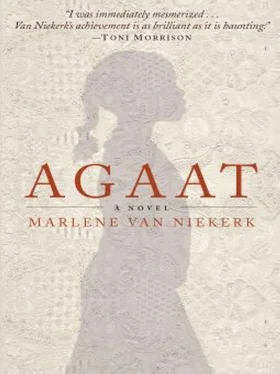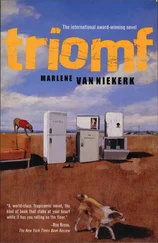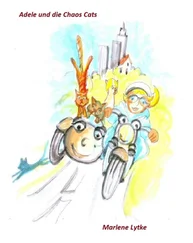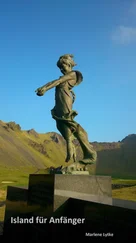Get out, out of my guts! he pushed you away, for heaven’s sake go and blow your nose!
But you knew that if he got rough enough with you, you could keep him with you. Then at least he was involved. You learnt to use his anger, the energy of it. It was less than nothing.
A smack in the face, a blow on the back.
Billing and cooing on Grootmoedersdrift.
You couldn’t stop crying about it all. Am I then never allowed to feel weak? you asked, but that only infuriated him further.
It went quickly. Two, three years. You no longer guided his hand over your body to teach him how to touch you. You were after something else. You bent your head and sucked him off and caught his semen in your hand and tried to inseminate yourself.
His preference in any case. I don’t want to see your face when you’re so miserable, he said. Often he didn’t even notice that you were crying.
You prayed every time that you would take, made pictures in your head of cells simultaneously shooting, a comet shower, a cataclysm, a fusion.
Why can the animals manage it so easily? Am I of the wrong nature, then? Comfort me then, just hold me, you pleaded at times.
But if he didn’t put a cushion over his head and turn his back on you, he took his blanket and went to sleep in the stoep room.
Weekends and holidays were worst, and the quiet times on the farm between seasons. Because then he wanted to go mountain-climbing or running or rowing, or to read his books by Ian Fleming and Louis L’Amour, always as far away as possible from you. You had to think up things to keep him on the farm. Painting, a new silage tower, large-scale yard clearance, the big compost project with the adjacent farms.
You saw to it that other people came to inspect the work at the most dramatic moment. When a project had just been completed, you arranged parties, lunches for the neighbours, agriculture days with information sessions for the members of the farmers’ associations.
Then Jak beamed in the glow of all the attention, his best foot well forward.
Let’s redesign the garden, you said, there’s nothing that makes a homestead look as attractive as a garden. You haven’t forgotten, have you, that you promised it to me, my paradise?
Don’t think I can’t see through you, he said, you’re more wily than the snake. That’s the only bit of paradise that there’ll ever be on this farm.
You thought, if we can’t be lovers, let us then at least be friends. Friends can learn to differ, even over paradise. But he was forever wanting away, to other people.
You tried to console yourself with work. When there was plenty of pressure on the farm, things that had to be done urgently and accurately, you were at your happiest. You liked working with people in a team, according to a fixed plan, with a predictable outcome, with a view to the long term. That’s the only way a farm can work, you’d learnt from your mother.
We can buy you an American saddle horse if the wool price is good, you said to Jak, or a new car if we sell the new Jersey heifers.
If you rewarded him, he helped you well at times. But simply to ask him for something, that wouldn’t do.
Why must I always hold your little hand in everything that you want done? After all, you’re the real farmer here, or so you’d have me believe.
It took you a long time to accept that if you wanted things done on the farm, you would have to think it all up yourself. And that you should turn to OuKarel and his son to help you take things in hand and make a start. They looked at each other and OuKarel wordlessly signalled to Dawid: Do as you’re asked to do. That Jak did not like. If he saw that they were helping you, he would make a show of lending a hand for a while. They soon discovered what was going on, pressed him for more pay.
They’d lost their sharecrop, was OuKarel’s argument, how was he supposed to support his dependants? Not that you knew who exactly he meant, he’d been a widower for most of his life, and Dawid was to all appearances a loner, but as Jak with time succumbed to the pressure and restored half of the Okkenels’ status by making them foremen on Grootmoedersdrift, the dependants came and presented themselves: OuKarel’s second cousins and their wives and children who couldn’t all live off the carpentry business that his brothers ran in Suurbraak. A never-ending influx it was. The houses were over-full, but Jak refused to build on and forbade them to construct shacks.
Do you want the whole mongrel rabble with their so-called Scottish surnames and mission-station affectations here on your front stoep, Milla? Over my dead body, he said, enough is enough.
You tried to keep the peace by seeing to it that enough bags of flour and pails of milk found their way over the drift to the labourers’ cottages. And you tried to establish goodwill by regularly going to buy a chair or a little table from the family business in Suurbraak. The five Okkenel brothers, all of them like OuKarel with the high brow and the green eyes and the sharp nose, looked at you with shrewd understanding and knew just how to fix a price that accorded with your feelings of guilt. With the passing of time you realised that it had been a mistake to abolish the sharecropping. It was their only source of capital for buying good timber for furniture and there was enough wheat left after they’d sold the surplus to supply the whole clan with bread flour.
Jak would not hear of reinstating a sharing. He dreamed of a completely mechanised farm that would require only one or two pairs of hands.
There was never a contract, he said, your mother kept the people here for her own convenience, we are under no obligation. The fewer of them the better.
You were ashamed of the attitude. Where were the people to go? It was their land as well, after all, their place, and they also had to work and eat.
Why did you keep your mouth shut, Milla? What were you scared of? Why could you never think that there were other possibilities? And Jak, why did you tolerate his bluntness and his selfishness and his vanity? You were bemused at the time by the short stories you read in the magazines. The heroine who exclaims with flushed cheeks: Now I’ve had enough, now I’m leaving you! Otherwise not a single magazine would sell hereabouts, you thought. But you thought no further.
You tried to assess other wives’ husbands dispassionately and you couldn’t really see that you were in a worse position. Jak was still the most attractive and the most intelligent of the lot. Not one of the women you knew was ‘fulfilled’, as they said. You could see that in their faces. But they were unshakeably loyal. It was Basie this and Fanie that and Thys came first clap your hands. Especially those in your circle of friends. And yet everyone was always starved for company. Always somebody who wanted to listen. Not one of the women you knew of who didn’t get lonely on a hill-farm. Not that the exchange of commonplaces could keep you going.
For a few months at a time you could keep a reading group going, or a music-appreciation group, but the women sat taciturn in your sitting room. As if the music of Schubert and Brahms and Mahler embarrassed them. Bach was acceptable. Sounded sufficiently like church. The books that you lent them they returned unread to the half-moon table in the hall and for the rest spoke of patchwork and complained about their servants who stole soap.
What failed most miserably was the walking club for amateur botanists that you tried to get going. You didn’t know all that much yourself, but you’d inherited your father’s books on trees and fynbos and as child had learnt the first principles of plant identification at his knee. But after you’d invaded the foothills a few times with the little ladies, stumbling along in their Sunday-best shoes, and their dresses that snagged on everything, and the anxious out-of-breath countenances solely concerned about what they had to serve their husbands for supper, you gave it up. You were not like them, you thought, you’d been born to more adventurous ways.
Читать дальше












